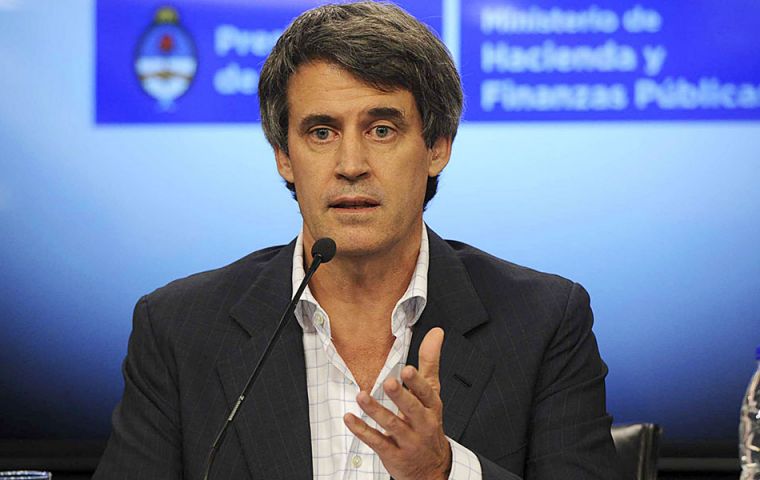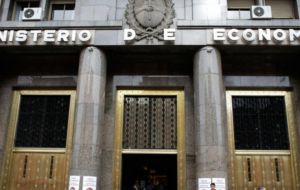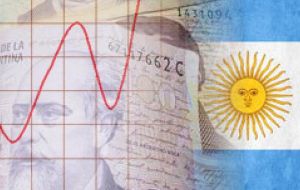MercoPress. South Atlantic News Agency
Brazil's recession greater risk than Brexit for Argentina: could chip 1.5 percentage points from GDP
 “Brazil is the difference between growing and not growing for the first year of our administration. It’s really critical,” said Minister Prat Gay
“Brazil is the difference between growing and not growing for the first year of our administration. It’s really critical,” said Minister Prat Gay  “It seems to us that Brexit is more an issue of distortions or disruptions around the developed world than it is in our region or in particular Argentina”
“It seems to us that Brexit is more an issue of distortions or disruptions around the developed world than it is in our region or in particular Argentina”  Argentina's corporate debt to GDP ratio is around 15%, considerably less than around 60% in most of Latin America.
Argentina's corporate debt to GDP ratio is around 15%, considerably less than around 60% in most of Latin America.  After admitting annual inflation to May of 42%, Prat Gay said he is confident in the second half of the year, when inflation should slow down to between 2/2.5%
After admitting annual inflation to May of 42%, Prat Gay said he is confident in the second half of the year, when inflation should slow down to between 2/2.5% Argentina’s annual rate of inflation was likely to have reached an annualized 42% through May, but should begin to slow in June with a return to growth also on the horizon, Finance Minister Alfonso Prat-Gay said in an address to investors in New York. The minister also said that for Argentina, Brazil's recession had a greater impact than Brexit.
“The government is very confident in the second half of the year, when the inflation rate would slow down to between 2 and 2.5% in June” said the Argentine minister.
“We think the dirty work is mostly done,” Prat-Gay said, calling president Macri “very brave” for spending his political capital on unpopular economic austerity measures such as the recent hike on natural gas, electricity and running water.
“The annual inflation rate at a national level rose from 30% when we took office to between 40 and 42%. Eight of those 12 percentage points are basically the direct and indirect impact of the increases on public utilities,” he said.
Monthly consumer prices rose 4.2% in May, the INDEC official revamped statistics bureau said last week. May was the first month for which official inflation data was published since Macri took office, though annual figures were not released.
The number is still above Central Bank chief Federico Sturzenegger’s monthly inflation target of 1.5% since September, and even higher when compared against Finance Minister Alfonso Prat Gay’s 2016 inflation target of 20 to 25% on the year.
Prat-Gay also addressed the upset caused by Brexit, Britain’s vote last Thursday to exit from the European Union, came at a time of increasing stability in Argentina.
“It seems to us that (Brexit) is more an issue of distortions or disruptions around the developed world than it is in our region, or in particular Argentina,” the Finance minister said. “We don’t want to get too carried away in saying that Argentina is a beacon of stability, but that is probably one way of looking at it,” he added.
Prat-Gay said Argentina needs investment to restore growth. The country’s corporate debt to gross domestic product ratio is around 15%, considerably less than around 60% in most of Latin America. The investment to GDP ratio is also low at less than 20%, he said.
“This is an economy that has ceased to invest over the last five years. Once we get the investment engine started again, that will create a boom,” he said.
Still, Prat-Gay said risks included an ongoing recession in Brazil, which would knock one to 1.5 percentage points off of Argentina’s GDP.
“Brazil is the difference between growing and not growing for the first year of our administration. It’s really critical,” he said. “We removed trade barriers so we would really appreciate if they followed our example and did the same.”




Top Comments
Disclaimer & comment rules-

-

-

Read all comments“We think the dirty work is mostly done,” Prat-Gay said.
Jun 27th, 2016 - 05:25 pm 0No it's not yet done. Prat-Gay and his buddies won't stop until they get Argentina back into debt up its ears, unemployment up to 15 per cent, and stagflation flourishing.
Meanwhile, the “rain of capitals” on which Macri's whole strategy is based, is slow a-coming and will be even slower in the new international context.
The only thing that is delaying social unrest is the opposition meltdown and the public opinion distraction after the opportune Jose Lopez incident.
However, the economy has this bad habit of ending up getting on the way of PR and cheap talk--which means Macri will sooner or later face the music.
@1
Jun 28th, 2016 - 03:04 pm 0Inflation, corruption, lack of reserves, recesion and unemployment is the legacy of CFK government. The fact that CFK government forged the official data doesn't mean that these issues didn't exist. It just means that they were not able to solve them or they didn't care about them.
During the current year crops' exportation is 60% superior compared to year 2015. This is part of the “dollar rain” that peronist say it doesn't exist. Thanks to this the “dollar clamp” was raised (uhhh...I'm sorry..I forgot that the “dollar clamp didn't exist”...wasn't it?)
External debt was not increased it just happnes that debts, such as the bond holders debt, was officially recongnized and had to be paid (another CFK not recognized legacy).
It is the first time since democracy returns (year 1983) and the first time since the '70s that a government wants to reduce inflation without external financiation.
#2 pgerman
Jun 29th, 2016 - 05:42 pm 0Of course, pgerman dutifully recites Macri government's credo that still attributes anything wrong to the work of the so-called previous government's “heavy legacy.”
“Inflation, corruption, lack of reserves, recesion and unemployment is the legacy of CFK government.”
Inflation: the slight reduction touted by the government comes from a record 40 per cent inflation, which rose 10 points over that of the previous government.
The worst side of lower inflation is that it comes from a cooling of the economy, as the opening of imports destroys domestic small and medium size companies, layoffs multiply and disposable income is dramatically reduced.
Corruption: While the mainstream media generously talks about--verified or not--corruption cases involving former kirchnerist officials, the investigation of Macri's involvement on undeclared offshore activities continues, with the recent imputation of Lanus mayor and Macri's close friend Néstor Grindetti for illegal offshore maneuvers.
No shortage of stories on today's Buenos Aires Herald, one of the few providing balanced coverage:
“Police brutality allegations scalate dramatically in Jujuy.”
“Judge okays inspection into President Macri's sworn statements.”
Don't miss “Questions remain over prosecutor Marijuan’s trip to the US,” which shows the ethics and links of one of Macri's loyal friends in the judicial party.
As time goes by, the public opinion will begin to realize the dead end towards which the current government is steering Argentina.
Commenting for this story is now closed.
If you have a Facebook account, become a fan and comment on our Facebook Page!